Text
Spoilers for the new Reverse 1999 chapters
TW Psychophobia, Torture, Intergenerational trauma?, Suicide Attempts...
Now started playing the new story chapters of Reverse 1999. And while I KNEW what I was going to go through, the instant I saw Isolde tied up on the electric chair... I reminded.
I reminded what it did to me as a mentally ill kid to play Alice Madness Returns. What it did to me when I watched Penny Dreadful as a young adult. So I paused. To talk about it.
I am one of the lucky ones. I never had go to a psychiatric ward (my parents tried to get me there after my first suicide attempt, but it was an adult only service, and as a 16 years old I wasn't old enough to enter, luckily my mom was there to attend to me all summer since she worked from home).
I did suffer the stigma, in many ways, but I did not suffer the medical abuse to a no return point extent. Of course the abuse in general is still terrible, but I got lucky. Some friends did not. Someone you know surely got through that. Everyone knows someone broken by psychiatric institutions. And a lot of these unlucky individuals did not recover, and sometimes died from this abuse.
We can argue that it's much better now, that there isn't torture anymore (that's a lie, getting tied down is torture, getting isolated is torture, and I won't start talking about how close to prisons psychiatric wards are, and yes I hate the reality of prisons too).
We can argue about all of this.
But we are still counting our dead. Mourning people that were not helped, not cured, but drowned even further into despair and left in shreds.
And my body knows, when I watch these pieces of fiction, when I read the history of how our condition were "studied", how the DSM got written. I feel an overwhelming and unspeakable fear. Because I know, it's me on the screen. It's my story. It could've been my exact story.
It has been the story of many unluckiest, unprivileged people (at this point I have to mention that of course, it is not just pure luck : if you aren't white, if you're lgbtq+, if a woman, you're particularly poor, if you're from a pious family, if you have commorbidities and many more can add to the list, it's going to be harder and you are the first ones on the list).
I can't ease this feeling. It's like a survival instinct. You know you don't want to ever have to go there. Even if "it can be fine sometimes", "there are some safe wards" or whatever. If you are mentally ill you just know.
So a kind reminder : always consider this when dealing with someone close to you that have mental health issues and seems to not be able to get the help they need, or sometimes are in emergency state. Please don't call the cops. Don't call the emergency services. Please don't get them to a psychiatric ward first without trying everything else, especially if they aren't ok with going there. It is, in and of itself a traumatic experience to live, and even the less abusive institution ARE abusive because psychiatry's history is what it is. It's not because some privileged people got out of there unharmed (and again I can't agree with that) that everyone would.
Anyway, it's all over the place, I can't find a good way to word this, because there is no good way to word that I'm terrified by all that shit, with reason.
Take care of yourself, of your loved ones. You can't change the world, and it is designed in a way that we still have very few alternatives to psychiatry nowadays, so you can't really avoid it all together. Just know that it's not only fiction and incredibly triggering for some of us.
Cheers. If you can relate and wish to read the new Reverse content maybe take your time to be ready, not alone, in a good mindset.
#reverse 1999#spoilers#isolde#reverse 1999 isolde#mental illness#mental health#mentally ill#psychophobia#psychiatry#psychiatric wards#mental health history#intergenerational trauma#cptsd#representation#venting#personal
19 notes
·
View notes
Text
Listening to a podcast about Urbex. They are visiting a disaffected psychiatric hospital for women. This hospital opened at the beginning of the 20th century and closed before the end of the century.
The persons exploring the place are the podcaster, and two psychiatrists who work in current psychiatric hospitals. One the two doctors seems to practice Urbex the other one (the older) is also a historian of psychiatry in France. So they explain the history of the place and of psychiatry in the 20th century in France as they visit.
They just explained that an estimated 40 000 - 45 000 mentally ill people who were interned in French psychiatric hospitals died between 1940 and 1945 (when the Germans occupied France)! They did not die in deportation or were directly murdered by the Germans no. They mainly died of hunger, cold and lack of proper medication (TB made a carnage). This was linked to the policy of rationing put in place by l’Etat Français (Vichy) to make sure that French people could still eat and warm their house while sending a lot of the national production to Germany and many young men to work in Germany (so the Germans would be free of that pesky productive work that allows you to survive, and could go kill people in Eastern Europe more easily).
In this system, psychiatric hospitals simply did not receive enough food, coal, and medication to keep their patients alive! The one who survived generally received food from their family (who were living under rationing too) or worked around the hospitals and could take part in black market activities (to an extent).
Basically 40 000 - 45 000 French people died of famine between 1940 and 1945, a state organized famine. I had never heard of this before.
2 notes
·
View notes
Text
Families of Asylum Patients
This one has really hit me in the feels this morning, and I'm usually good at staying very emotionally detached from my research.




There are a sequence of letters on file showing that Mary's parents regularly sent her clothing and shoes, which suggests that they were in relatively comfortable financial circumstances. But then when one looks at the probate file for Mary's father, who died in July 1888...

...we see that her parents had been living in poverty for some time, selling everything they owned and relying on the charity of friends to survive. And yet, even when they were struggling to maintain themselves, they continued to prioritise sending their daughter packages of clothing so that she might be able to have the small comfort in the asylum of things of her own, instead of her being forced to wear asylum clothing.
This kind of thing is why I hate the common assumption that families discarded relatives in asylums because they were selfish and uncaring. The asylum was an absolute last result for most families and there is so much evidence showing that they continued to care about their loved ones, even when they were confined for years or decades. History should emphasise these cases, not the rare cases of dodgy husbands succeeding in having their wives falsely declared insane.
#history#medical history#mental health history#victorian history#mental health#family history#social history
5 notes
·
View notes
Text



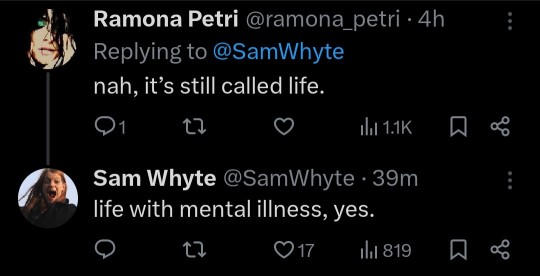
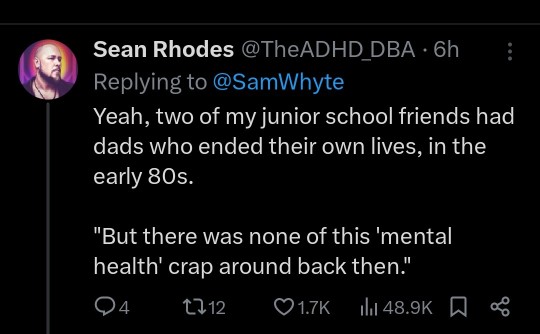
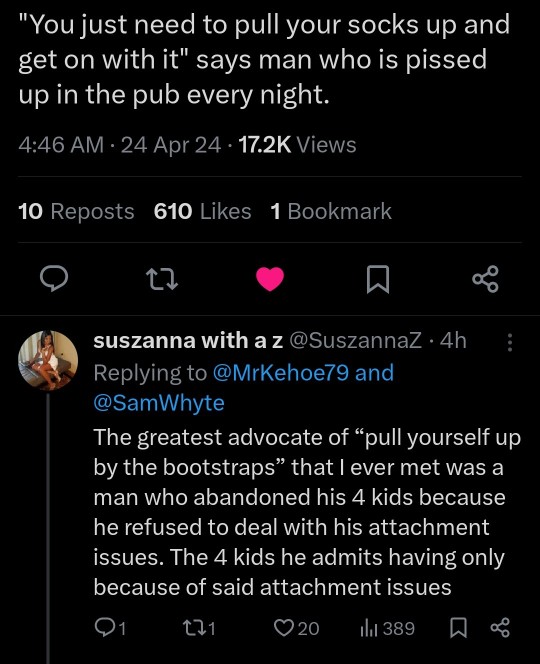


8K notes
·
View notes
Text
Saw pics of me at 16 (2009) & I just ....
I was so incredibly disconnected from what I was doing. I did theater, but mainly enough to keep social connections & it helped me escape from real life and put my emotions somewhere else, into someone else. I also did colorguard (with the pretty flags and marching band) but that was also incredibly detached. I'd be carried from the field to our little camp spot for the day because I marched on shin splints until I was crying & would roll a prop off the field as one of the only guys. I did a few other things, enjoyed them, but I can't recall feeling actively engaged in the experiences.
I wish I'd have been able to explain this experience sooner. I thought it was just intense depression, but then a bipolar diagnosis came and that seemed to make sense. I just, it's frustrating to pay for a psychiatrist & they don't ever ask enough questions or the right questions during the 10-30 minute appointment that would have indicated literally any of my current concerns. It's frustrating but...here we are and that's okay.
0 notes
Text
I recently had to do a project in one of my psych classes, and man, I knew that CBT was used for every little thing, but seeing over and over, "do CBT! CBT is the best for every mental illness!" was so jarring. I'm absolutely biased because of my own experiences, but I just don't think it's as universal a treatment model as it's touted.
If you didn't benefit from CBT, it's not because you're lazy or didn't try hard enough or lacked intelligence or foresight into your own needs. Frankly, it's a therapy model that (I think) shouldn't be the only readily-accessible model and among the only therapy models covered by insurance. Some of us should not be treated in a CBT model and that's okay. It's not a sign of poor character or unreasonable demands, and if you don't think it's a model that works for you, then it's your right to express that!
#mental health#mental health advocacy#it was just so annoying because every resource i could access for this project often ONLY recommended cbt and#that just doesn't seem helpful for a good chunk of people#because i know i never benefitted from that model of therapy#obligatory: i am not against this therapy. me having a negative experience with it is not indicative that i believe it should be abolished'#if it works for you: KEEP DOING IT. cbt is not inherently harmful for MANY people and it's a good and valuable tool for many#but the overemphasis of cbt as the Only Therapy Model You Need sends this message that YOU failed...#...if you don't miraculously recover with that therapy model. it often feels like you'll Fail Recovery/Therapy and you're now a Bad Person#i've tried for over a decade to stick out cbt with a dozen therapists to boot. so i think i know a thing or two about my experiences with it#and overall its an unimpressive model (for me) as someone whos had a history with abuse and miscellaneous mental knickknacks rattling around#it's also frustrating because i genuinely like psych and i love learning about people#it's just. i'm tired of only being exposed to cbt (because i hate it honestly)#i feel similarly about cbt as i do with sigmund fucking frued#anyway i just want other insane people (affectionate) to remember that they deserve to not beat themselves up over this#if you're an insane person reading this: i love you i love you i love you i love you#i will share a slice of cake and homemade bread with you <3
1K notes
·
View notes
Text
This book I'm reading about a Mental Health Hospital on the 20th century is so amazing! This book is about a terrible tragedy about Human Neglect and Male Cruelty (since lots of girls and women were thrown there for showing emotions, for being an abuse victim, for being the wife, etc), but I'm so amazed and touched by how girls and women had bonded and done for each other despite how miserable and hungry they were
I need to buy this book after all!
#Holocausto Brasileiro#mental health history#mental health herstory#brazilian history#história brasileira#história mineira
0 notes
Text
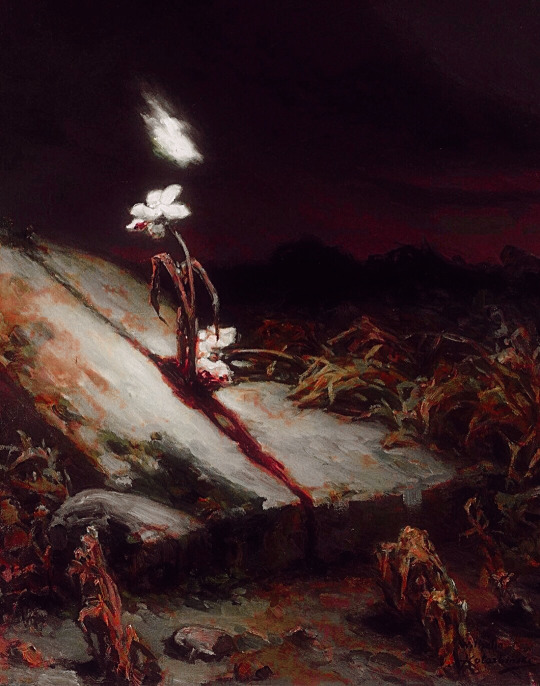
Grave of a Suicide Victim (1900)
— by Wilhelm Kotarbiński
#painting#art#art history#classical art#dark art#dark academia#mental health awareness#classic academia#oil on canvas#oil painting#artist#art blog#goth#gothic#artists#flowers#night#red academia#historical painting#historical art#art community#art gallery#academia
4K notes
·
View notes
Text
Wow.
"This tendency to misdiagnose victims was at the heart of a controversy that arose in the mid-1980s when the diagnostic manual of the American Psychiatric Association came up for revision. A group of male psychiatrists proposed that "masochistic personality disorder" be added to the canon. This hypothetical diagnosis applied to any person who "remains in relationships in which others exploit, abuse, or take advantage of him or her, despite opportunities to alter the situation." A number of women's groups were outraged and a heated public debate ensued. Women insisted on opening up the process of writing diagnostic canon, which had been the preserve of a small group of men, and for the first time took place in the naming of psychological reality.
I was one of the participants in this process. What struck me most at the time was how little rational argument seemed to matter. The women's representatives came to the discussion prepared with carefully reasoned, extensively documented position papers, which argued that the proposed diagnosis concept had little scientific foundation, ignored recent advances in understanding the psychology of victimization, and was socially regressive and discriminatory in impact, since it would be used to stigmatized disempowered people. The men of the psychiatric establishment persisted in bland denial. They admitted freely that they were ignorant of the extensive literature of the past decade on psychological trauma, but they did not see why it should concern them. One member of the Board of Trustees of the American Psychiatric Association felt the discussion of battered women was "irrelevant". Another stated simply, "I never see victims".
In the end, because of the outcry from organized women's groups and the widespread publicity engendered by the controversy, some sort of compromise became expedient. The name of the proposed entity was changed to "self-defeating personality disorder." The criteria for the diagnosis were changed, so that the label could not be applied to people who were known to be physically, sexually, or psychologically abused. Most important, the disorder was included not in the main body of the text but in an appendix. It was regulated to apocryphal status within the canon, where it languishes to this day."
Judith L. Herman, M.D., Trauma and Recovery.
#women's history#psychiatry#feminism#psychology#mental health#history#history of psychology#women's rights#trauma#violence against women
293 notes
·
View notes
Text

A Woman with Lypemania
Engraving by Ambroise Tardieu, 1838
#my post#art#engraving#mental health history#mental health#psychology#1830s#b&w#lypemania#ambroise tardieu#etienne esquirol
9 notes
·
View notes
Text

Good strategy
243 notes
·
View notes
Text
"I believe in poems as I do in haunted houses.We say someone must have died here."
Rosa Alacia,"Voice:An essay, from My other tongue."
@luciferslilith7
#aesthetic#dark academia#chaotic academia#spilled ink#classic academia#academia#spilled thoughts#light academia#classic literature#the secret history#donna tartt#rosa alacia#qoutes#dark academia books#dark academia quotes#the song of achilles#the goldfinch#the picture of dorian gray#if we were villains#dead poets society#poets corner#writers of tumblr#writeblr#booklr#feelingsoftheday#mental health#gothic academia#gothic literature#gothic quotes#fyodor dostoevsky
276 notes
·
View notes
Text

I made this for a bluesky reply, but it is also relevant everywhere else in life!
2 notes
·
View notes
Text


from two months ago, when i was busy with my last ever finals (i meant to post this back then)!! my 3L hobonichi ended in march so i had to use the last few grid pages as a weekly schedule bc i wanted to keep the school year contained in one planner, which actually worked out great since i wasn't doing much everyday aside from studying....
#not me going to therapy back-to-back on the weekend bc my mental health was in shambles#i will NOT be missing law school lmaooo#if anything i miss college the most bc i took fun classes like art history and medieval history :((#tea-tuesday#studyblr#mine#studyspo#study inspiration#study#studying#study motivation#makeshift hobonichi#hobonichi#chaotic academia#chaotic academic aesthetic
285 notes
·
View notes
Text
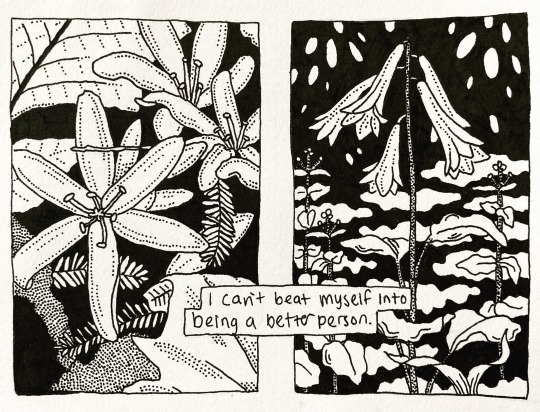
A page spread from the zine I’m working on- Brain School 2: Some Things I Learned 🖤
#illustration#my work#drawing#art#sketchbook#stippling#natural history#botanical illustration#botanical drawing#mental health#mental health art#mental health zine#zine in progress#wildflowers
2K notes
·
View notes
Text

A photograph of Rosemary Kennedy before her father forced her to have a lobotomy at the age of 23. The lobotomy went wrong and left her paralyzed and unable to speak. Her father then placed her in a mental institute where she remained until she passed away at the age of 86. After the surgery, her family, including JFK, never spoke of her again.
218 notes
·
View notes